If you’ve ever wondered how IELTS examiners decide whether to give your essay a Band 6, 7, or 8, you’re in the right place. In this article, we break down the official IELTS Writing Task 2 band descriptors into plain English. Understanding these criteria is crucial for any IELTS candidate aiming for a high score – it’s like seeing the marking “rubric” the examiners use. We’ll explain each of the four scoring categories, give examples of what a Band 6 vs Band 8 looks like for each, and provide tips on how to improve. (This article is a companion to our “IELTS Writing Task 2: Complete 2025 Guide”, so be sure to check that out for a broader overview of Task 2 strategies. Here, we’ll focus specifically on scoring criteria.)
The Four Criteria for IELTS Writing Task 2
IELTS examiners evaluate your Task 2 essay on four criteria, each worth 25% of your Writing score:
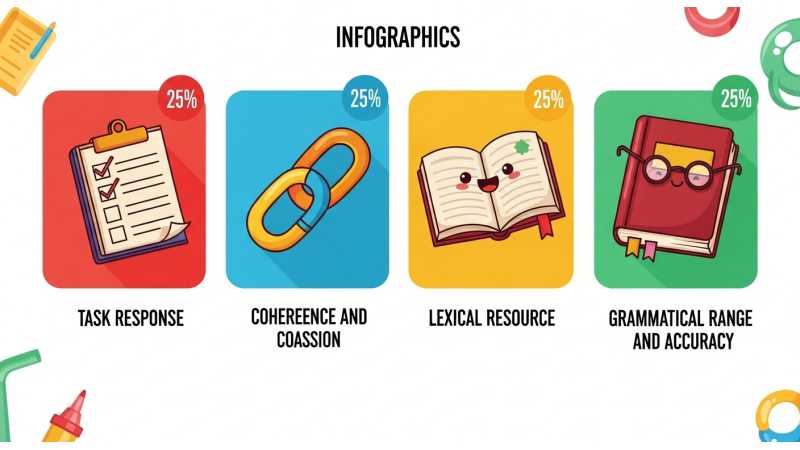
Task Response – Did you fully address all parts of the question? Did you present a clear position (for opinion essays) and provide supporting ideas and examples? Essentially, Task Response is about what you say and whether you answered the task appropriately.
Coherence and Cohesion – Is your essay well-organized and logical? Do you use paragraphs properly? Are ideas connected smoothly with linking words and references? This measures how easy it is to follow your writing and how well you connect your ideas.
Lexical Resource – How good is your vocabulary? Do you use a wide range of words and phrases accurately with correct spelling? Are you using some less common or topic-specific words instead of repeating basic vocabulary? This criterion checks the range and precision of your word choice.
Grammatical Range and Accuracy – Do you use a variety of sentence structures (simple, compound, complex) correctly? Is your grammar generally accurate, with only a few minor errors? This includes punctuation as well. Essentially, it looks at both the complexity of your grammar and the correctness.
Each of these categories is scored from Band 0 to 9. The descriptors for each band level (publicly available from IELTS) detail what performance is like. Let’s clarify what is expected in each category by focusing on the differences between a mid-level (Band 6) and a high-level (Band 8) performance, since many students aim to jump from 6 to 7 or higher. (Note: Band 7 generally falls in between these descriptions. By understanding 6 vs 8, you’ll see the trajectory of improvement.)
Task Response: Fully Answering the Question
Definition (Task Response): This criterion is about addressing the task completely and relevantly. It includes presenting a clear thesis or overall position, covering all parts of the prompt (for example, both questions in a two-part question, or both views in a discuss question), and developing your ideas with explanations or examples. Basically, the examiner checks: “Did this person do what they were asked to do?”
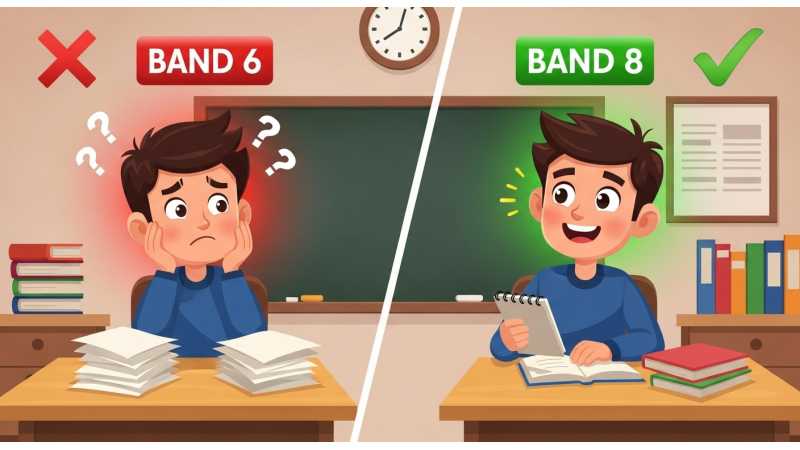
Band 6 Task Response: “The essay answers the question but may not cover all aspects. Arguments lack depth, and ideas are sometimes underdeveloped. There may be some irrelevant information, and the conclusion may not effectively summarize the main points.”
Explanation: At Band 6, you likely addressed the general topic, but perhaps not completely. Maybe you discussed some parts of the question and not others, or your examples weren’t clearly tied to your main argument. Your stance might be present but not super clear or consistent. For instance, if the question had two parts and you only really focused on one, that would cap you around Band 6 for Task Response. Also, your support for your ideas might be a bit thin – perhaps you made a point but didn’t explain it fully or gave no example.
Band 8 Task Response: “The essay fully answers the question, presents a clear stance, and develops ideas with strong supporting examples. It avoids unnecessary information and maintains a clear focus on the topic throughout.”
Explanation: At Band 8, you have done everything asked. If it’s an opinion essay, you have a definite opinion and stick to it. If it’s a discuss-both-views essay, you’ve discussed both thoroughly and given your view. Every part of the prompt is covered. Each main idea you present is extended with explanations and/or examples, so there’s depth to your answer. Importantly, all your content is relevant – you’re not going off on tangents or throwing in memorized text. The essay also likely has a clear conclusion that summarizes your argument or directly answers the question. There’s a sense of completeness when a Band 8 Task Response is read.
How to improve Task Response: Always spend time analyzing the question. Underline keywords and check how many parts the question has. If it says “advantages and disadvantages,” plan to write about both. If it asks for an opinion, state it clearly and consistently. Try to be specific rather than general – avoid sweeping statements without support. And ensure to write at least 250 words (Band 6 or below often correlates with under-length essays). A fully developed answer usually falls in the 260-300 word range, which naturally gives you space to cover the task well. Finally, check your conclusion – it should directly answer the question or provide a clear summary of your stance.
Coherence and Cohesion: Organizing Your Essay
Definition (Coherence and Cohesion): This is about how well your writing flows. Coherence means your ideas are organized logically – both overall (does your essay have a sensible structure?) and within paragraphs (do sentences link to each other logically?). Cohesion refers to the use of connective words (however, therefore, furthermore, for example, etc.) and other methods (like pronouns, repetition of key terms, parallel structures) to ensure the essay is not just a collection of unrelated statements. It also includes paragraphing – using paragraphs to separate ideas.
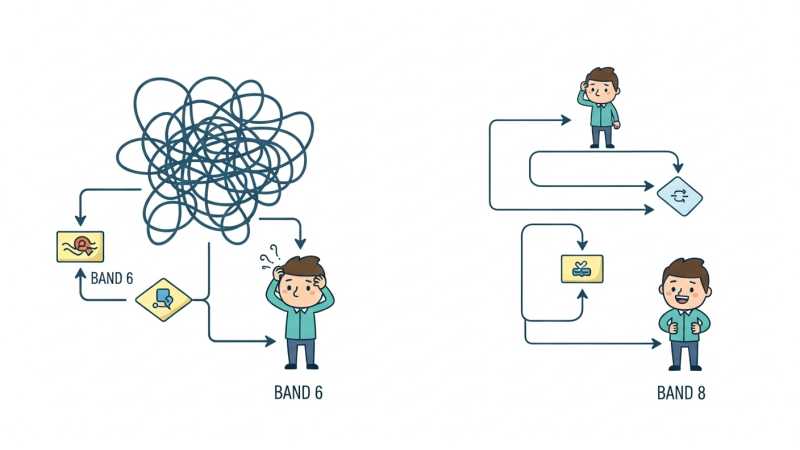
Band 6 Coherence & Cohesion: “Ideas are arranged logically, but the flow is sometimes unclear. Linking words are overused or misused. Paragraphs may not always be well-developed, and some sentences might not connect smoothly.”
Explanation: At Band 6, the essay isn’t a complete mess – there is some logical order, but it might feel a bit choppy or mechanical. Perhaps you used connectors in every sentence (“Firstly,… Moreover,… Additionally,…”) which can sound unnatural. Or maybe you started a new paragraph, but the central idea of that paragraph wasn’t clear (e.g., a paragraph that tries to do too many things). There might be instances of jumping from one point to another without a clear bridge. Paragraphing might be present, but maybe one paragraph contains two different topics (hurting clarity), or you have one very long paragraph that should have been split. Essentially, a Band 6 essay might require the reader to re-read to follow the logic, instead of flowing effortlessly.
Band 8 Coherence & Cohesion: “The essay has a clear structure with well-connected ideas. Cohesive devices are used naturally and effectively. Each paragraph is fully developed with logical sequencing of ideas and appropriate transitions between them.”
Explanation: Band 8 coherence means your essay is a breeze to read. The examiner can follow your argument without any confusion. You likely start each body paragraph with a clear topic sentence (so the main idea is obvious). Within the paragraph, each sentence follows logically from the previous one – you might use linking words like “for example” to give an example, or “as a result” to show effect, etc., but you don’t overdo it. The transitions feel natural, like the essay is “telling a story” or making a coherent argument. There are no sudden jumps in thought. Paragraphing is on-point: each paragraph has one clear focus, and you probably used an appropriate number of paragraphs (typically 4 or 5 for Task 2). Also, reference words (like pronouns this, it, they) are used correctly to refer to ideas in previous sentences, avoiding repetition and improving flow. Overall, a Band 8 essay is well-organized and easy to follow from start to finish.
How to improve Coherence & Cohesion: Start by planning your structure (even a brief outline) before writing – this ensures your ideas are logically ordered. Use paragraphs deliberately: a simple structure is Intro, Body 1, Body 2, (Body 3 if needed), Conclusion. Ensure each body paragraph has a distinct main idea. Use a variety of linking words, but don’t start every sentence with one – it’s not necessary. Instead, use linking words between clauses and use referencing (e.g., “this trend”, “such measures”, “these problems” to refer to a previous idea) to create flow. Read high-scoring essays to see how they manage cohesion; often, they don’t use an overt connector in every sentence, yet the ideas still flow logically – this is because of good use of pronouns and logical ordering of information. Lastly, after writing, revise your paragraphing: check that you haven’t mixed topics in one paragraph and that each paragraph isn’t too short (one or two sentences is usually too short and may signal underdevelopment) or too long (a page-long paragraph could be hard to follow).
Lexical Resource: Vocabulary Usage
Definition (Lexical Resource): This refers to your vocabulary range and accuracy. Examiners look for your ability to use words precisely and appropriately. They also consider if you can use less common vocabulary (words or expressions that are more advanced or specific to the topic) and idiomatic language (in appropriate measure, and in a formal way for writing). Spelling and correct word formation (e.g., using the correct form of a word – economy vs economic vs economically) also come under this criterion.
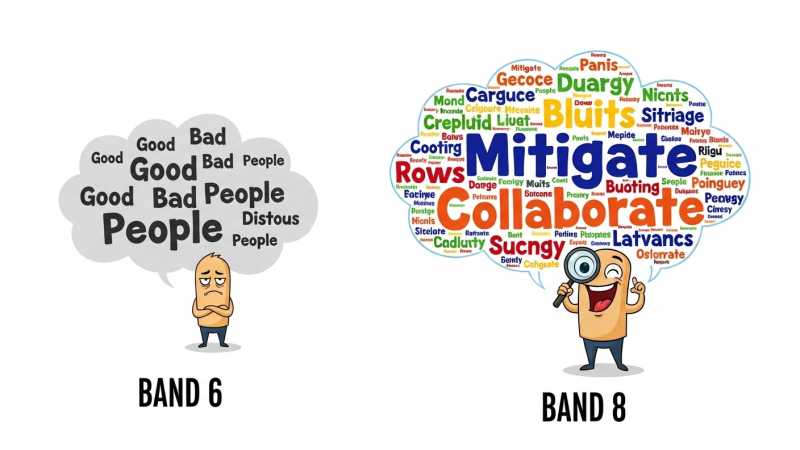
Band 6 Lexical Resource: “Uses a limited IELTS vocabulary with frequent repetition and occasional word choice errors. Synonyms are sometimes used incorrectly, and there may be reliance on basic words and phrases.”
Explanation: At Band 6, your vocabulary gets the job done, but it’s quite basic or repetitive. You might be using the same common words over and over (e.g., “people, good, bad, problem, solution” repeatedly). When you try to use a fancier word, it might come out awkward or slightly incorrect collocation (e.g., saying “very big issue” – understandable but not as natural as “serious issue”). There could be errors like using the wrong form of a word (“investation” instead of “investment”) or confusing word choices (“society improvement” instead of “social improvement”). Spelling errors might appear more than just rarely. Essentially, Band 6 vocab is adequate but not impressive; it may limit precision. For example, you might use “bad” to describe anything negative because you don’t have a wider range (instead of using “harmful, detrimental, disadvantageous” where appropriate). Or using “a lot of” repeatedly instead of varying with “numerous, many, a significant number of,” etc.
Band 8 Lexical Resource: “Demonstrates a wide range of vocabulary with precise and varied word usage, including collocations and synonyms. The choice of words enhances clarity, and idiomatic expressions are used appropriately.”
Explanation: Band 8 vocabulary means you have a strong command of words. You can discuss the topic using a variety of terms and expressions, which not only avoids repetition but also conveys subtleties in meaning. For example, in discussing technology and crime, a Band 8 response wouldn’t keep saying “technology is good” or “technology is bad”; it would use terms like “technology is a double-edged sword,” “surveillance systems,” “cybersecurity,” “illicit online activities,” etc. The words fit the context perfectly (collocations are correct – e.g., “commit a crime” not “do a crime”). You might include some idiomatic or figurative language, but appropriately for formal writing (e.g., “double-edged sword” as used above is idiomatic but acceptable in formal usage). There are minimal spelling errors, maybe a typo or two, but very few. Also, if you don’t know an exact uncommon word, you can paraphrase effectively to get your point across precisely. The reader feels that you chose words carefully to convey meaning – sometimes even “simple” words can be precise (that’s fine!), but there will be some “higher-level” vocabulary as well that seems naturally used. The key is, Band 8 vocab enhances the essay; it doesn’t confuse the reader, it clarifies the ideas.
Example – Vocabulary Band 6 vs Band 8:
Band 6 phrase: “the government should make rules” (simple and okay, but not specific)
Band 8 phrase: “the government should implement stringent regulations” (more precise and formal: “implement” collocates with “regulations”, “stringent” adds meaning of strictness).
Band 6 sentence: “People should try to reduce pollution.” (correct, but basic vocabulary and structure)
Band 8 sentence: “Individuals and authorities should collaborate to mitigate environmental pollution.” (uses more advanced words: collaborate, mitigate, environmental pollution – a collocation – and clearly sounds more academic)
(See how the Band 8 versions use more specific and higher-level vocabulary, making the statement more formal and precise. The meaning is similar, but the expression is elevated.)
How to improve Lexical Resource: Read and practice! Expand your vocabulary by reading IELTS model essays, newspapers, journals, or good blogs on common IELTS topics (environment, education, technology, etc.). Note down useful collocations (words that frequently go together). For instance, we say “tackle a problem” (not solve a problem all the time), “take measures,” “drive change,” “pose a threat,” etc. When learning a new word, learn its usage (e.g., do we say “depend on”, what prepositions go with it, etc.). Use a good dictionary to see examples. Practice paraphrasing sentences – take a simple sentence and try to rewrite it with different words (keeping the meaning). Also, during writing, if you notice you used “important” five times, try to substitute a couple with synonyms like “crucial, significant, essential” (as long as they fit). However, beware of forcing rare words incorrectly – accuracy matters more than just throwing fancy words. So, learn the contexts of words. Finally, pay attention to spelling; English spelling can be tricky, so whenever you learn a new word, practice writing it out. Even a high-level word won’t impress if spelled wrong. A good exercise is to take an IELTS topic and brainstorm specific vocab for it – for example, “environment” might yield: greenhouse gases, renewable energy, deforestation, conservation, etc. Use those in sentences to ensure you know how.
Grammatical Range and Accuracy: Sentence Structure and Grammar
Definition (Grammatical Range & Accuracy): This criterion looks at two things: the range of grammar (are you using only very basic sentence structures, or do you have complex sentences, perhaps conditional sentences, relative clauses, etc.?) and the accuracy of your grammar (how many errors are there, and do they impede understanding?). It also includes punctuation (commas, full stops, etc., used correctly)
Band 6 Grammar: “Sentences contain grammatical errors, and complex structures are attempted but often incorrect. There may be issues with subject-verb agreement, tense consistency, and punctuation errors that affect readability.”
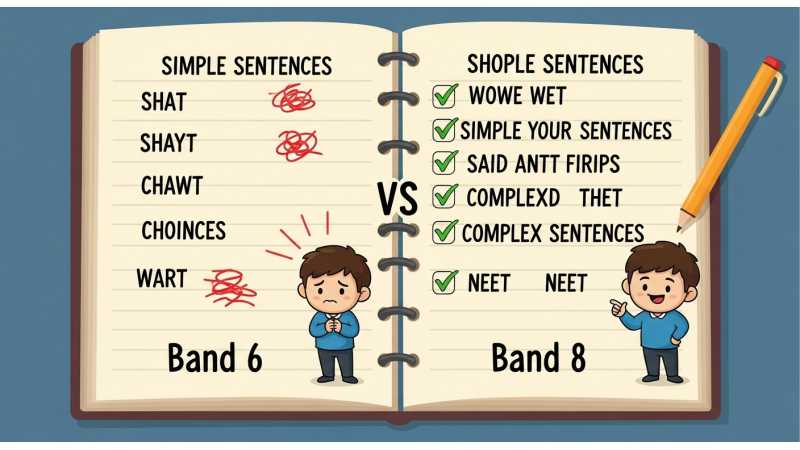
Explanation: At Band 6, you probably can write simple and some compound sentences fairly well, but when you try more complex structures, mistakes creep in. Errors might include things like incorrect verb tenses, missing articles (a/the), plural-singular mistakes, or word order issues. Perhaps you write a complex sentence but it’s fragmentary or you lose control of it. Punctuation might be a problem – e.g., forgetting the comma in a compound sentence or using a comma instead of a full stop leading to run-on sentences. If errors are frequent or sometimes obscure meaning, the band score stays around 6. For example, a Band 6 essay might have a sentence like: “If government implement policy, it reduce crime rate.” – we understand it, but grammatically it should be “If the government implements a policy, it reduces the crime rate” (subject-verb agreement and article usage issues). These kinds of errors are noticeable and repetitive at Band 6. You might also see mostly short sentences or overuse of “and”/“but” instead of more diverse clause structures.
Band 8 Grammar: “Uses a mix of complex and simple sentences with high grammatical accuracy and minimal errors. There is effective use of conditionals, passive voice, and other advanced grammatical structures.”
Explanation: Band 8 grammar is characterized by both variety and accuracy. The essay will have a good number of complex sentences (sentences with multiple clauses) – for example, relative clauses (“technology, which has evolved rapidly, has changed…”), conditional clauses (“If governments implemented X, they would achieve Y”), perhaps modal verbs to express possibility, etc. These structures will mostly be correct. Mistakes will be minor and rare – maybe a slip in article usage once, or a missing plural “s” somewhere, but generally it reads as grammatically polished. The writer knows when to use periods vs commas, uses parentheses or dashes if needed correctly, and capitalizes properly. They can handle tricky structures like not only X but also Y, or inversion for emphasis (though that’s not necessary, just showing possible range). Importantly, complex sentences are used appropriately – not just for show, but to convey relationships between ideas (cause-effect, contrast, condition, etc.). At Band 8, the majority of sentences are error-free, and errors that do exist are often just typos or one-off slips that don’t confuse meaning at all.
Band 6 vs Band 8 Grammar Example:
Band 6: “Many people has opinion that using internet have bad effect on children.” (Subject-verb agreement errors: should be “many people have” and “internet has”; also article missing before “bad effect”).
Band 8: “Many people are of the opinion that extensive internet use can have a detrimental effect on children.” (Uses a more complex turn of phrase “are of the opinion that…”, adds modal “can” and an adjective “detrimental” – combining lexical and grammar range – all grammatically correct.)
Another example, focusing on sentence complexity:
Band 6: “Technology is good. It helps police. It also helps people feel safe. But some people use it for crime.” (Four very simple sentences – correct, but very basic and choppy.)
Band 8: “Technology has undoubtedly aided law enforcement and given citizens a greater sense of security; however, it has also provided criminals with new tools, meaning that its net impact on crime is a double-edged sword.” (Here we see a complex sentence with a semicolon connecting two main clauses, the use of “however” as a conjunctive adverb, and a participial phrase “meaning that…”. This would likely be written correctly by a Band 8 writer. There’s variety and the sentence is longer and more complex, yet clear.)
How to improve Grammar: Achieving Band 7+ grammar requires two things: 1) cleaning up common mistakes, and 2) incorporating more complex structures correctly. Start by identifying your frequent errors – do you often drop the third-person “s”? Mix up tenses? Forget articles? Work on those with targeted exercises (there are many IELTS grammar resources). For range, practice combining sentences. Take two simple sentences and join them with a conjunction or turn one into a subordinate clause. E.g., “Technology helps police. It is very advanced.” → “Technology, which is very advanced, helps police” (now you used a relative clause). Or use conditionals: “If technology is used properly, it can help reduce crime.” Try writing different types of complex sentences: conditional (if… then…), relative clause (who/which/that), using “because/although/despite” etc. Then have someone check them or compare to correct examples. A useful tip is to analyze model essays for sentence structures. Identify how many sentences are simple vs complex and how they’re constructed. You don’t need to write extremely long sentences all the time (that can lead to errors if you’re not careful), but ensure you have a mix. One strategy: aim to have at least one or two sentences per paragraph that use subordinate clauses or transitional clauses. Also, mind your punctuation: learn where to put commas in complex sentences (e.g., after an introductory clause: “Although many people believe X, …”). Finally, practice writing under timed conditions but also do slow practice where you really craft sentences and look up rules if unsure. Over time, your “fast” writing will benefit from what you learned in “slow” practice. And always proofread your essay if time permits – sometimes you can catch and fix a grammar mistake (like a missing article or wrong verb form) upon rereading.
Examples: Band 6 vs Band 8 Snippets
To solidify our understanding, let’s compare two short excerpts (not full essays) on the same topic – one that would likely be Band 6, and one Band 8 – and analyze why:
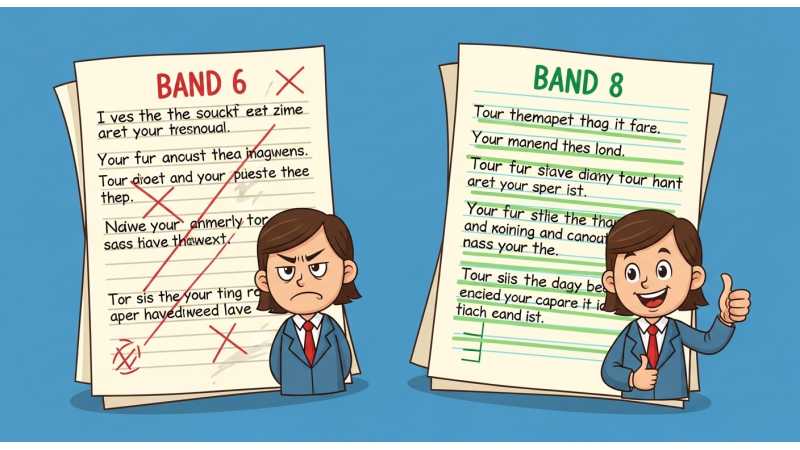
Band 6 Example Snippet:
“In todays world technology increase crime. Some people think it help to stop crime because camera everywhere. Other people think it not help, it make new crime like hacking. In my opinion technology is good but sometime bad use cause problem.”
Issues: You can see subject-verb agreement errors (“technology increase crime” should be increases), missing articles (“because camera everywhere” needs “because cameras are everywhere”), run-on sentence without proper connector (“think it not help, it make new crime” should be split or use “because it makes”), and overall simplistic vocabulary and grammar. Also “todays world” needs a possessive apostrophe “today’s”. The ideas are somewhat there (tech helps stop crime vs makes new crime) but they’re not clearly or correctly expressed. This would likely be around Band 5 or 6 due to the frequency of basic errors and coherence issues.
Band 8 Example Snippet:
“In today’s world, technology has a complex impact on crime. Some argue that it helps to curb crime through ubiquitous surveillance and advanced forensic tools. Others believe that technology facilitates new forms of crime, such as hacking and cyber fraud, thus offsetting its benefits. In my opinion, while technology has indeed introduced cybercrime, it has overall been a powerful tool in crime prevention when properly managed.”
Why it’s better: This version corrected grammar issues (notice “today’s world,” “technology has…” etc.). It uses more advanced vocab (“curb crime”, “ubiquitous surveillance”, “facilitates new forms of crime”, “offsetting its benefits”, “crime prevention”). It also employs complex sentence structures: the second sentence uses “through” to attach a reason, the third uses a subordinate clause “such as hacking…,” and even the phrase “thus offsetting its benefits” is a participle clause adding information. The ideas are the same two views, but articulated clearly and formally. There are no glaring grammar errors. This reads as something that would score highly in all criteria.
By comparing like this, you can really see the gap. The Band 8 snippet is roughly what you’d find in a high-scoring essay: clear, varied, and accurate.
Tips for Achieving a Higher Band in Each Criterion
Task Response: Always identify all parts of the task and check that your essay addresses each. State a clear position (thesis) if required. Support each idea with explanation or example (one supporting point is minimum, two is better if you have time/depth). Stay on topic – every paragraph should link back to the task. And meet the word count (>250 words).
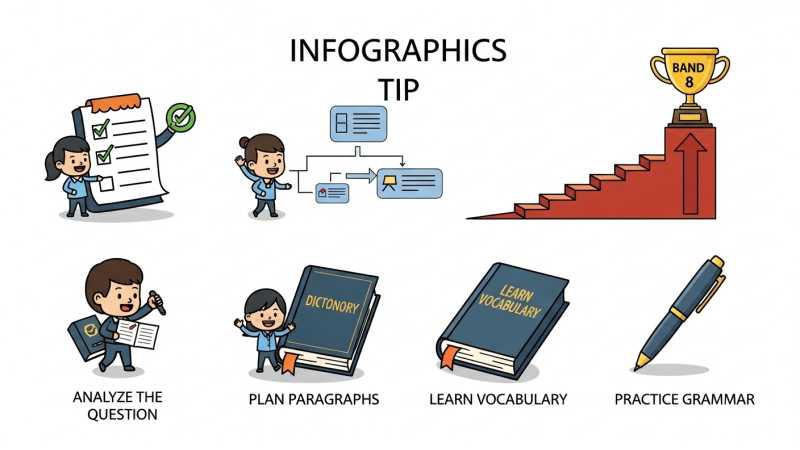
Coherence & Cohesion: Plan your paragraphs. Use linking words appropriately (aim for a mix: addition, contrast, example, cause-effect connectors as needed). Don’t overuse one type (don’t begin every sentence with “And” or “Moreover”). Make use of pronouns to connect sentences and avoid repeating the same nouns too much. Leave a line or indent to show new paragraphs clearly. Think about the logical order – maybe chronological, or least to most important, or one side then the other – and stick to one approach.
Lexical Resource: Build topic-specific vocabulary. Practice paraphrasing the question and key ideas in different words. During the test, if a word isn’t coming to you, describe the idea in another way rather than leaving it blank or using the wrong word. Use adjectives/adverbs to be more precise (e.g., “a significant increase” instead of “a big increase”). If you’re not sure about a word’s usage, it might be safer to use a word you know well (an accurately used common word is better than a misused rare word). Review common IELTS topics vocab (education, environment, health, technology, etc.).
Grammar: Focus on common structures: get comfortable with complex sentences that use because, although, if, who/which. Ensure you have variety – if you notice your essay has mostly short sentences, try combining some. If it’s all long sentences, occasionally use a short one for impact and to ensure clarity. Review your common mistakes: e.g., do a bunch of exercises on articles if that’s a weakness, or tenses if you slip between present/past inappropriately. Remember that even native speakers proofread; checking your work can catch those last errors (like a missing plural or wrong verb ending). Over time, aim to reduce errors to just a couple per essay at most, none of which hinder meaning.
By targeting each criterion, you can systematically improve your IELTS Writing score. It might feel like a lot at first, but often improvements in one area help another (e.g., planning better (Task Response) can also help coherence, and learning new vocabulary can help express ideas better which can boost coherence and perceived task response too).
Final note: Always write practice essays and get feedback if possible. If you can’t get formal feedback, compare your essays with band 7 or 8 samples. Be honest: if you notice your essay has many more errors or simpler words, work on those areas. Use the official band descriptor tables (public version) to self-evaluate: for each criterion, ask “Am I doing what Band 7 description says or am I more like Band 6 here?” This analytical approach will pinpoint where you need to improve. Understanding these band descriptors is empowering – instead of guessing what the examiners want, you know what they are looking for. Now it’s a matter of practicing and implementing this knowledge. Good luck, and happy writing!

About the AuthorWelcome to TechIELTS. I’m Md. Jahangir Alam, an experienced engineer with over 15 years in electrical and automation systems. Alongside my engineering career, I’ve developed a strong interest in English language learning and IELTS preparation.
I hold a Duolingo English Test score of 135 (IELTS 7.5 equivalent) and am currently pursuing an M.Sc. in Cyber Security from Royal Holloway, University of London. I use my technical background to create clear, structured IELTS learning materials for students and professionals.
👉 Connect on LinkedIn
